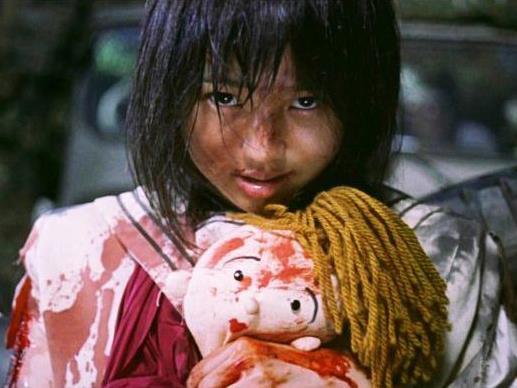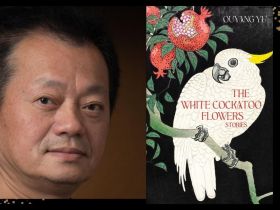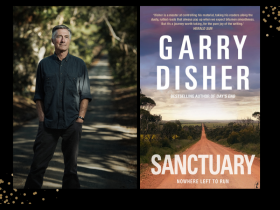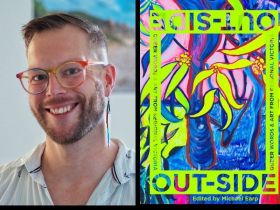A still from the 2000 film Battle Royale.
We’ve all woken up on a remote island with metal collars fitted to our necks, forced to battle to the death with our contemporaries on national broadcast or lose our own lives. The plot sounds familiar – but is it the course of events in cult classic Battle Royale? Or a depiction of the panic created by a lack of resources and jobs within the literary sector?
It’s a tough time to be an emerging storyteller. Cuts to our sector can feel like they’re deep, and coming from every side with slashes to arts funding, and whole departments.
There is a growing sense of scarcity; a feeling that creatives are crowded around the same small bowl, which surely can’t be big enough to feed us all. It’s starting to feel as though the world is satirising itself.
But in our darkest hours, it’s important to remember the power of community and supporting one other, and making an effort to ensure that we don’t allow our sector to devour itself competing over limited resources.
State of the arts
The 2015 Macquarie University survey of Australian authors found that on average, authors are earning only $12,900 a year for their work. Short of winning a major prize like the Miles Franklin or the Man Booker, this certainly feels like skating on thin ice.
Further, widespread cuts to arts funding in the literary sector has predominantly impacted individuals and small-to-medium organisations, particularly impacting the young and emerging writers who represent the future of our national literature.
In the wake of sweeping job cuts, content cannibalism and fake news a Senate Inquiry on the Future of Public Interest Journalism was launched, which feels like one positive step toward ensuring we protect the role of journalism for the public good.
We are in danger of heading toward a single narrative – and if history is anything to go by, that is no good thing. We need multiple perspectives in the media, the news, the stories, the arts and culture we consume in order to make sense of the world and connect to each other.
Joan Didion said, ‘we tell ourselves stories in order to live,’ and indeed the necessity of storytelling has never felt more vital.
Finding your people
Linh Nguyen (deputy editor) & Leah McIntosh (editor & founder) from Liminal Magazine, a new online space for the exploration, interrogation and celebration of the Asian-Australian experience, feel that community has to be core at the very beginning of new creative projects.
‘Starting out in the creative industries can be terrifying. When building a project from scratch, your success is entirely dependent on community. Find your people, build support networks; it’s impossible to do it alone,’ they write.
‘For us, Liminal Magazine could only exist as a collaboration. We created Liminal in response to what we saw as the lack of representation of Asian-Australian voices and perspectives; in our current cultural climate, we believe it is vital for such spaces and publications to exist.
‘To survive in the arts, you need to build solidarity and connections, and invest in yourself; always experiment and take calculated risks.’
Festivals are for building community
Writers’ festivals are one space within which you can combat the isolation and solitude writing sometimes incurs. Groups of writers awkwardly gathering in the same space to expound ideas and swap stories are not lacking in Australia – both in physical spaces and online.
I was lucky enough to join the Voiceworks editorial committee as a poetry editor many years ago through Express Media, and found my feet and a place to connect with other word-nerds. This also opened up the Wheeler Centre, and made approaching other organisations within the space such as the Emerging Writers’ Festival, Australian Poetry and Writers Victoria far less intimidating.
One of the biggest things I believe the Emerging Writers’ Festival has to offer is community. My own journey with the Emerging Writers’ Festival began as an attendee, then a Creative Producer, then festival artist and now here I am standing in boots that are mighty big to fill.
EWF provided an antidote to the idea that writing was necessarily combative. I found not only a space or a network, but a community of individuals willing to learn together and lift each other up.
Fight to the death
To continue the Battle Royale metaphor, you’re much more likely to survive and thrive if you team up and work together to dismantle a system that is discouraging collaboration, mutual support and community.
It’s happened before, and I’m sure will happen again that I’ve applied for the same funding or jobs as good friends of mine. Talking openly and making an effort to engage with and support each other’s work, encouraging a spirit of collegiality rather than competition has always felt like it stood me in better stead than fighting over scraps.
Ultimately, we all want to be able to make the work that is important to us, as well as paying our rent, eating and having some sense of financial security. Supporting each other through the pressures everyone is facing is the way we try to make sure that the voices we need to hear don’t give up or get lost.
Hold onto hope
Be kind to yourself, and others. Pushing your way to the front might get you there faster, but wouldn’t you rather get to where you’re going and be able to look around and celebrate with everyone you’ve taken the ride there with? All the folks that you’ve helped to pull up, and that have given you a foothold too?
Rebecca Solnit says in her book Hope in the Dark that ‘inside the word “emergency” is “emerge”; from an emergency new things come forth. The old certainties are crumbling fast, but danger and possibility are sisters.’
Look around you, and see the hope that community can offer. Hope is a marvellous thing. Hold onto it, lodge it somewhere deep in your ribcage. Graft it to the bones. Store it in your marrow. Remember the spaces where you can connect with your fellows, and remember you don’t have to go it alone.
Izzy Roberts-Orr is the Director of the Emerging Writers’ Festival, which runs from 14-23 June 2017. Visit www.emergingwritersfestival.org.au for details.





